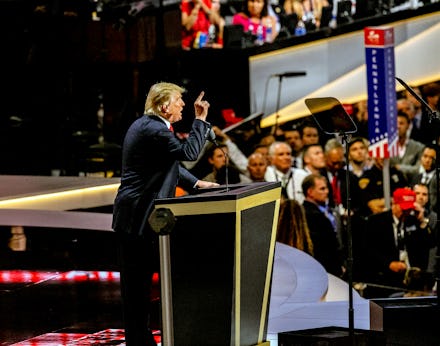The GOP invited the gun-toting St. Louis couple to speak at the convention

The white couple — Patricia and Mark McCloskey — that waved their guns at a crowd of protesters earlier this summer will be speaking at the Republican National Convention. It's as odd as it is unsurprising, the elevation of the personal injury lawyers charged with felony counts of unlawful use of a weapon to the national stage. But it's also demonstrative of the 2020 Republican Party, which has made leaders out of viral stars, the president included.
Months ago, hundreds of St. Louis residents were marching toward the home of the city's Democratic mayor, Lyda Krewson, who had doxxed activists on Facebook Live. The protesters turned down a private street, where the McCloskeys resided in their $1.15 million home. The two emerged from their residence wielding guns, which they proceeded to wave "in a threatening manner" toward protesters, per St. Louis prosecutor Kim Gardner.
Shortly thereafter, Gardner brought felony charges against both husband and wife, arguing that they were the ones creating and escalating a dangerous situation, not the protesters. The legal action brought additional national attention to the gun-waiving couple, and Republican leaders like President Trump quickly came to their defense. GOP leaders argued that the McCloskeys had a right to "defend" themselves and their property, and it's likely that the two will be pardoned by the state's Republican governor.
By rewarding the couple with a speaking slot at one of the biggest nights in politics, the GOP is stating loud and clear what its values and priorities are. It's unclear what the McCloskeys will say during their allotted time, but their mere presence communicates the GOP's affinity for guns and disdain for the Black Lives Matter movement.
There's a metaphor here: In 2016, Trump ran on a platform of "taking back" the U.S.; this year, he and other Republicans are adamant that we need to protect the country against external and internal threats. The McCloskeys fit that narrative neatly, as white people "protecting" their property with force against the perceived threat of people of color near them.
Of course, the other takeaway from this situation is obvious: When white people waive weapons around, potentially endangering the lives of hundreds of protesters, they're rewarded with a platform that will be shared by some of the biggest names in politics. When unarmed Black people walk down the street, they're killed by police, by their neighbors, by self-appointed citizen watchdogs.